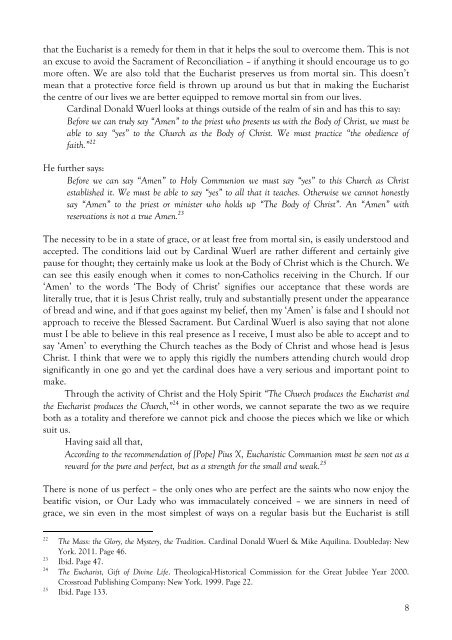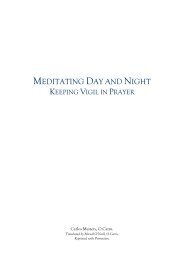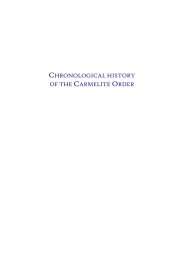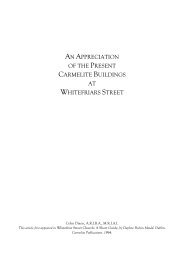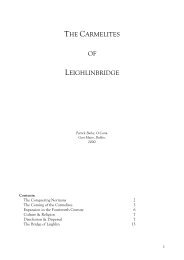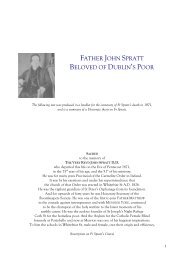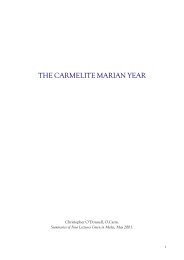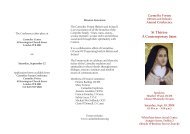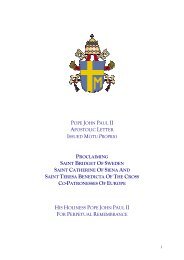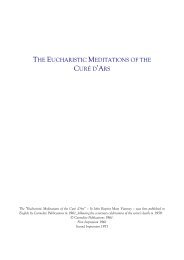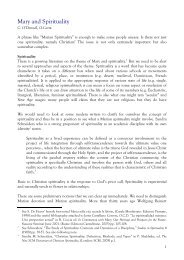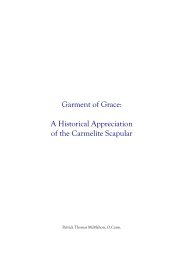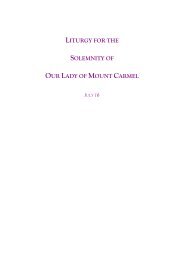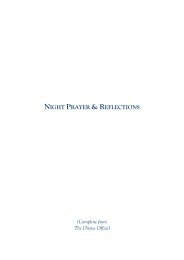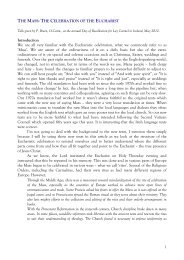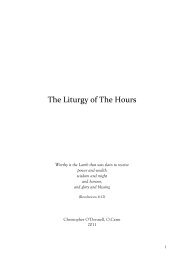THE EUCHARIST Introduction For all of us here, when we talk about ...
THE EUCHARIST Introduction For all of us here, when we talk about ...
THE EUCHARIST Introduction For all of us here, when we talk about ...
Create successful ePaper yourself
Turn your PDF publications into a flip-book with our unique Google optimized e-Paper software.
that the Eucharist is a remedy for them in that it helps the soul to overcome them. This is not<br />
an exc<strong>us</strong>e to avoid the Sacrament <strong>of</strong> Reconciliation – if anything it should encourage <strong>us</strong> to go<br />
more <strong>of</strong>ten. We are also told that the Eucharist preserves <strong>us</strong> from mortal sin. This doesn’t<br />
mean that a protective force field is thrown up around <strong>us</strong> but that in making the Eucharist<br />
the centre <strong>of</strong> our lives <strong>we</strong> are better equipped to remove mortal sin from our lives.<br />
Cardinal Donald Wuerl looks at things outside <strong>of</strong> the realm <strong>of</strong> sin and has this to say:<br />
Before <strong>we</strong> can truly say “Amen” to the priest who presents <strong>us</strong> with the Body <strong>of</strong> Christ, <strong>we</strong> m<strong>us</strong>t be<br />
able to say “yes” to the Church as the Body <strong>of</strong> Christ. We m<strong>us</strong>t practice “the obedience <strong>of</strong><br />
faith.” 22<br />
He further says:<br />
Before <strong>we</strong> can say “Amen” to Holy Communion <strong>we</strong> m<strong>us</strong>t say “yes” to this Church as Christ<br />
established it. We m<strong>us</strong>t be able to say “yes” to <strong>all</strong> that it teaches. Otherwise <strong>we</strong> cannot honestly<br />
say “Amen” to the priest or minister who holds up “The Body <strong>of</strong> Christ”. An “Amen” with<br />
reservations is not a true Amen. 23<br />
The necessity to be in a state <strong>of</strong> grace, or at least free from mortal sin, is easily understood and<br />
accepted. The conditions laid out by Cardinal Wuerl are rather different and certainly give<br />
pa<strong>us</strong>e for thought; they certainly make <strong>us</strong> look at the Body <strong>of</strong> Christ which is the Church. We<br />
can see this easily enough <strong>when</strong> it comes to non-Catholics receiving in the Church. If our<br />
‘Amen’ to the words ‘The Body <strong>of</strong> Christ’ signifies our acceptance that these words are<br />
liter<strong>all</strong>y true, that it is Jes<strong>us</strong> Christ re<strong>all</strong>y, truly and substanti<strong>all</strong>y present under the appearance<br />
<strong>of</strong> bread and wine, and if that goes against my belief, then my ‘Amen’ is false and I should not<br />
approach to receive the Blessed Sacrament. But Cardinal Wuerl is also saying that not alone<br />
m<strong>us</strong>t I be able to believe in this real presence as I receive, I m<strong>us</strong>t also be able to accept and to<br />
say ‘Amen’ to everything the Church teaches as the Body <strong>of</strong> Christ and whose head is Jes<strong>us</strong><br />
Christ. I think that <strong>we</strong>re <strong>we</strong> to apply this rigidly the numbers attending church would drop<br />
significantly in one go and yet the cardinal does have a very serio<strong>us</strong> and important point to<br />
make.<br />
Through the activity <strong>of</strong> Christ and the Holy Spirit “The Church produces the Eucharist and<br />
the Eucharist produces the Church,” 24 in other words, <strong>we</strong> cannot separate the two as <strong>we</strong> require<br />
both as a totality and t<strong>here</strong>fore <strong>we</strong> cannot pick and choose the pieces which <strong>we</strong> like or which<br />
suit <strong>us</strong>.<br />
Having said <strong>all</strong> that,<br />
According to the recommendation <strong>of</strong> [Pope] Pi<strong>us</strong> X, Eucharistic Communion m<strong>us</strong>t be seen not as a<br />
reward for the pure and perfect, but as a strength for the sm<strong>all</strong> and <strong>we</strong>ak. 25<br />
T<strong>here</strong> is none <strong>of</strong> <strong>us</strong> perfect – the only ones who are perfect are the saints who now enjoy the<br />
beatific vision, or Our Lady who was immaculately conceived – <strong>we</strong> are sinners in need <strong>of</strong><br />
grace, <strong>we</strong> sin even in the most simplest <strong>of</strong> ways on a regular basis but the Eucharist is still<br />
22<br />
23<br />
24<br />
25<br />
The Mass: the Glory, the Mystery, the Tradition. Cardinal Donald Wuerl & Mike Aquilina. Doubleday: New<br />
York. 2011. Page 46.<br />
Ibid. Page 47.<br />
The Eucharist, Gift <strong>of</strong> Divine Life. Theological-Historical Commission for the Great Jubilee Year 2000.<br />
Crossroad Publishing Company: New York. 1999. Page 22.<br />
Ibid. Page 133.<br />
8


